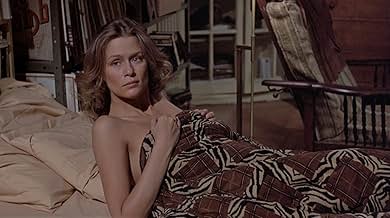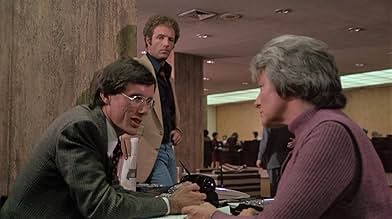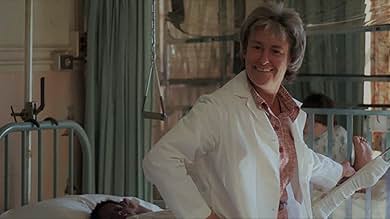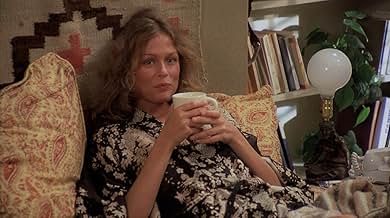NOTE IMDb
7,1/10
6,9 k
MA NOTE
Axel Freed est professeur de littérature et une passion pour le jeu. Quand il perd tout son argent et en emprunte à sa petite amie, puis à sa mère, il cumule les dettes sans pouvoir s'arrête... Tout lireAxel Freed est professeur de littérature et une passion pour le jeu. Quand il perd tout son argent et en emprunte à sa petite amie, puis à sa mère, il cumule les dettes sans pouvoir s'arrêter de jouer.Axel Freed est professeur de littérature et une passion pour le jeu. Quand il perd tout son argent et en emprunte à sa petite amie, puis à sa mère, il cumule les dettes sans pouvoir s'arrêter de jouer.
- Réalisation
- Scénario
- Casting principal
- Récompenses
- 1 nomination au total
Avis à la une
This is a film that must be seen to be believed.
Caan is extraordinary; the emotional truth of this film penetrates each line, each scene...The most searing and intense and exact ending in modern film. The straight-forward telling of a professor with a gambling problem does not prepare one for the scale and price of betrayal and redemption of human emtions that are portrayed. A stunning film.
Caan is extraordinary; the emotional truth of this film penetrates each line, each scene...The most searing and intense and exact ending in modern film. The straight-forward telling of a professor with a gambling problem does not prepare one for the scale and price of betrayal and redemption of human emtions that are portrayed. A stunning film.
Sometimes he wins; but mostly he loses. Gambling is an addiction for Axel Freed (James Caan), a professor of English literature and lover of classical music. The film is set in New York City.
The object of the obsession can be almost anything on which a bet is placed: dice, cards, a basketball game, a college football match. It really doesn't matter. Axel just can't keep from making bets. He's like two different people. In a classroom setting, he is logical and intelligent. But when betting, he throws away the logic in favor of risk taking. In these situations he seems to lack the normal psychological "brakes" that could be applied to his destructive over-betting. In his own words: "I like the threat of losing". And always in the background are the thugs and the con men that lord over Axel, when he borrows to gamble, but can't pay his debt.
Some of Axel's classroom lectures have real thematic value. The ideas relate both to him, and incidentally to some modern-day politicians. For example, a person "... claims an idea is true because he wants it to be true, because he says it's true. And the issue isn't whether he's right, but whether he has the will to believe he's right, no matter how many proofs there are that say he's wrong". Axel continues: "D.H. Lawrence says Americans fear new experience more than they fear anything. They are the world's greatest dodgers, because they dodge their own very selves". Heavy stuff.
Despite a disappointing ending, "The Gambler" is an interesting character study of a personality type that is all too prevalent in modern society. The film's color cinematography is generally dark, in keeping with the film's theme. Overall acting is fine. Paul Sorvino gives an especially convincing performance, as does James Caan. The plot proceeds rather slowly.
Mostly, the film has terrific thematic value. It encourages the viewer to pause and reflect, to ponder, to question one's own motivations. That is a trait lacking in many current movies.
The object of the obsession can be almost anything on which a bet is placed: dice, cards, a basketball game, a college football match. It really doesn't matter. Axel just can't keep from making bets. He's like two different people. In a classroom setting, he is logical and intelligent. But when betting, he throws away the logic in favor of risk taking. In these situations he seems to lack the normal psychological "brakes" that could be applied to his destructive over-betting. In his own words: "I like the threat of losing". And always in the background are the thugs and the con men that lord over Axel, when he borrows to gamble, but can't pay his debt.
Some of Axel's classroom lectures have real thematic value. The ideas relate both to him, and incidentally to some modern-day politicians. For example, a person "... claims an idea is true because he wants it to be true, because he says it's true. And the issue isn't whether he's right, but whether he has the will to believe he's right, no matter how many proofs there are that say he's wrong". Axel continues: "D.H. Lawrence says Americans fear new experience more than they fear anything. They are the world's greatest dodgers, because they dodge their own very selves". Heavy stuff.
Despite a disappointing ending, "The Gambler" is an interesting character study of a personality type that is all too prevalent in modern society. The film's color cinematography is generally dark, in keeping with the film's theme. Overall acting is fine. Paul Sorvino gives an especially convincing performance, as does James Caan. The plot proceeds rather slowly.
Mostly, the film has terrific thematic value. It encourages the viewer to pause and reflect, to ponder, to question one's own motivations. That is a trait lacking in many current movies.
The theme of addiction is a favourite area for film makers and "The Gambler" stands as the best and most intelligent film about the addiction of gambling. The fact that it is a little known or seen film is perhaps to do with its intellectual script which, with references to Dostoyevsky, may be too pretentious for some. However, rather than being a cleched film about a good man's decent into the hell of addiction this is a film about a selfish, egotistical man, from a good background, who happily wades deeper and deeper into his obsession.
The film's title pretty much sums up the story, with the character of Axel Freed, played by James Caan, beginning the film as a compulsive gambler but sinking further and further into his habit as the film goes on. He does this despite his undoubted intelligence - he is a college lecturer - and despite the pleading of his mother, rich grandfather and friends.
Freed is by no means a likeable character. Like most addicts all he cares about is his next fix and will happily ask his mother for tens of thousands of dollars to repay an outstanding debt. No one, including his girlfriend, played by Lauren Hutton, and his college students, remain untouched by his addiction, a decision which comes back to haunt him in the film's climax.
Many people have been left puzzled by the film's ending which is cryptic and unresolved. However this merely stands as a metaphor for addiction generally, that it can never be fully cured or ever totally go away. Axel is, however, obviously disgusted with himself and the effect his gambling has had on those around him and his late night journey into the all-black neighbourhood is his way of seeking retribution for his sins.
"The Gambler" provides James Caan with, alongside Michael Mann's "Thief", the best role of his career. The character of Axel Freed provides him with a range of emotions, especially in the way he treats those he cares about, as his gambling slowly takes precedence over everything else. Anyone who thinks James Caan's career began and ended with "The Godfather" should definitely see "The Gambler", as this proves he is one of the top actors of his generation and that he can play more than just the tough guy roles he is too often saddled with.
The film is brilliantly directed by Karel Reisz as not a single scene rings false despite a 111 minute running time. After directing the classic "Saturday Night and Sunday Morning" in Britain, Reisz relocated to America, but, unfortunately, "The Gambler" represents the only time he reached those heights again.
The film's title pretty much sums up the story, with the character of Axel Freed, played by James Caan, beginning the film as a compulsive gambler but sinking further and further into his habit as the film goes on. He does this despite his undoubted intelligence - he is a college lecturer - and despite the pleading of his mother, rich grandfather and friends.
Freed is by no means a likeable character. Like most addicts all he cares about is his next fix and will happily ask his mother for tens of thousands of dollars to repay an outstanding debt. No one, including his girlfriend, played by Lauren Hutton, and his college students, remain untouched by his addiction, a decision which comes back to haunt him in the film's climax.
Many people have been left puzzled by the film's ending which is cryptic and unresolved. However this merely stands as a metaphor for addiction generally, that it can never be fully cured or ever totally go away. Axel is, however, obviously disgusted with himself and the effect his gambling has had on those around him and his late night journey into the all-black neighbourhood is his way of seeking retribution for his sins.
"The Gambler" provides James Caan with, alongside Michael Mann's "Thief", the best role of his career. The character of Axel Freed provides him with a range of emotions, especially in the way he treats those he cares about, as his gambling slowly takes precedence over everything else. Anyone who thinks James Caan's career began and ended with "The Godfather" should definitely see "The Gambler", as this proves he is one of the top actors of his generation and that he can play more than just the tough guy roles he is too often saddled with.
The film is brilliantly directed by Karel Reisz as not a single scene rings false despite a 111 minute running time. After directing the classic "Saturday Night and Sunday Morning" in Britain, Reisz relocated to America, but, unfortunately, "The Gambler" represents the only time he reached those heights again.
a shocker in the 70s james toback's take on Dostoevskyan's fate, caan actually seems to act instead of react and gives a far more compelling performance than say, Thief 7 yrs. later. The Gambler is James toback's career making debut and has some of the most intense scenes toback would ever film despite numerous strong films later on. the ending is monumental. watch it build and be amazed. 9 of 10.
I saw this movie back in 1974/75 when it was released. I was already a Caan man. My comments are just random tidbits. Burt Young would go on to join Caan in 1975's The Killer Elite". Monkey (London Lee) was a stand-up comic who appeared numerous times on the Ed Sullivan show in the 60's. Lauren Hutton would trade Caan for Burt Reynolds in Gator. Caan earlier had beat out Burt for the role of Sonny Corleone. The line I remember most from this film is when Axel's mother is trying to get a bank loan to fund his gambling debt. There are some bureaucratic snafus and the bank officer isn't sure he has the proof to approve the loan to mom. Caan says "I came out of her womb and I know she's my mom. Now give her the god... money!".
Le saviez-vous
- AnecdotesAccording to James Toback, before his screenplay was accepted at Paramount Pictures, and was making the rounds with actors, Peter Boyle was first interested in playing the lead. Robert De Niro lobbied hard for the role, to the point where De Niro started to dress like the writer. Toback pressured director Karel Reisz to meet with De Niro. After meeting him, Reisz said that he would not, and could not consider De Niro for the role, and if Toback kept insisting, he would not be allowed to collaborate on the film further.
- GaffesAxel knocks the pimp's hat off on the second punch. It reappears on his head on the following one.
- ConnexionsFeatured in WatchMojo: Top 10 Gambling Movies (2014)
- Bandes originalesSymphony No. 1 in D
Written by Gustav Mahler (as Mahler)
Performed by Koninklijk Concertgebouworkest (as The Concertgebouw Orchestra)
Conducted by Bernard Haitink (as Haitink)
Courtesy of Philips Records
Meilleurs choix
Connectez-vous pour évaluer et suivre la liste de favoris afin de recevoir des recommandations personnalisées
- How long is The Gambler?Alimenté par Alexa
Détails
Box-office
- Montant brut aux États-Unis et au Canada
- 1 305 782 $US
- Durée1 heure 51 minutes
- Mixage
- Rapport de forme
- 1.85 : 1
Contribuer à cette page
Suggérer une modification ou ajouter du contenu manquant

Lacune principale
By what name was Le flambeur (1974) officially released in India in English?
Répondre
































